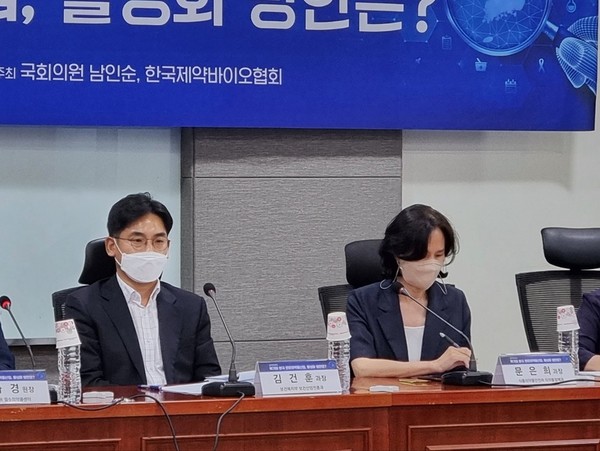Pharmaceutical industry officials criticized the government for providing almost no support to nurture the local active pharmaceutical ingredient (API) sector.
The Korea Pharmaceutical and Bio-Pharma Manufacturers Association (KPBMA) and Rep. Nam In-soon of the Democratic Party hosted a debate on revitalizing the API industry in Korea at the National Assembly Members’ Office Building in Seoul on Tuesday.

Speakers included Jung Soon-kyu, a senior researcher at the Korea Health Industry Development Institute, Kim Min-kwon, director of the international affairs team at Chong Kun Dang, Lee Young-mi, vice president of the Korean Industry Pharmaceuticals Association, and Ahn Myung-soo, a division head at the Korea Orphan & Essential Drug Center (KOEDC).
They emphasized that the domestic API sector needed the government’s active policy support, forming private-public governance, and deregulation. They repeatedly condemned the government’s lack of measures to support the API industry’s growth.
In response to the criticism, Kim Kun-hoon, director of the health industry development division at the Ministry of Health and Welfare, admitted that the government’s support has focused only on late-stage clinical trials or drug candidates' discovery.
“We learned that the API sector needed state support to develop production processes and establish manufacturing facilities. Therefore, we will search for measures in detail,” Kim said.
However, he was skeptical about the industry’s most-requested demand for favors in pricing drugs that contain Korean-made APIs.
Currently, the government guarantees 68 percent of the original drug’s price for a generic medicine made out of the generic drug maker’s API for a year after the first release of a generic drug. However, industry officials are demanding the government expand the scope of generic medicines from those using “self-made APIs” to “Korean-made APIs.” They also demand an extension of the drug price privilege period to more than a year.
Kim said he knew that the pharmaceutical industry was unhappy with the government’s drug pricing policy. Still, he said that the government has to treat local and foreign medicines non-discriminately because of free trade agreements.
He added that the government will raise a mega fund for pharmaceuticals soon and that not only finished drug makers but API manufacturers will get funding.
Moon Eun-hee, director of the pharmaceutical policy division at the Ministry of Food and Drug Safety (MFDS), explained why the ministry only has to focus policy support on particular APIs.
“Since the debacle of urea shortage, the Ministry of Economy and Finance has been monitoring the supply and demand of major economic goods, including APIs. And the MFDS is monitoring this,” Moon said.
As the MFDS has limitations to supporting all APIs, the ministry put priorities on supporting some APIs only, she said. “That is why we are thinking about giving more support for APIs of essential national drugs,” she added.
Under the Pharmaceutical Affairs Act, the health and welfare minister and the food and drug safety minister-designate essential medicines through consultation. So far, the government has named 511 essential drugs.
Moon said the MFDS received about 120 reports of the supply stoppage of essential drugs for the past three years, mainly due to the shortage of imported raw materials.
To reduce reliance on imported APIs, the MFDS is pushing for a study to support innovative technology for APIs. KOEDC will conduct the study, and KPBMA will participate as a trusted research institute. The study will cost 5 billion won ($3.8 million).
According to Moon, the study aims to support technology to produce essential national drugs. “The government will select APIs for essential national medicines that are expected to pose a public health risk due to an unstable supply and develop technology to produce those APIs,” she said.
“After the production technology development, we will grant the permit to a company vowing to produce and supply this drug and give administrative support in the approval process,” she added.
Moon emphasized that the MFDS actively communicated with the industry to address business difficulties.
The government had not recognized multiple manufacturers of APIs of approved drugs because different manufacturers have different quality standards. However, the MFDS plans to recognize multiple manufacturers of APIs as long as finished drugs have the same quality, Moon said.

